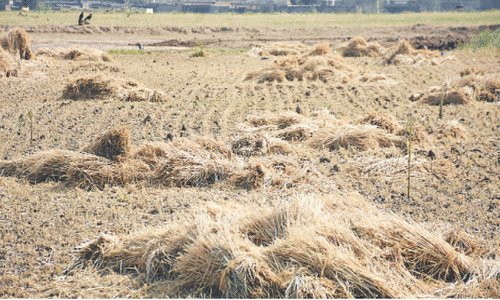KARACHI: The 17th Hamza Wahid Memorial Lecture organised by Irtiqa Institute of Social Sciences at PMA House on Wednesday had scholar and award-winning author Dr Fahmida Hussain Memon looking at the ‘Globalisation of cultures and importance of mother tongues’.
“After Partition the people of Sindh started speaking Urdu just to help the migrants coming here feel welcome. But the favour was never returned by the Urdu-speaking migrants. And today, even if there are 10 Sindhi people in a room conversing in their language and there is only one Urdu-speaking individual among them, he would ask them to speak in Urdu as he can’t understand them otherwise,” said Dr Memon.
‘Own your languages and be proud of them’
She added that the British believed in a ‘divide and rule’ policy. Thus they divided one language into two — Urdu and Hindi. “But it is basically the same language as proven by Bollywood films, which both the Urdu-speaking and Hindi-speaking people can understand very well,” she said.
Coming back to the Partition of India, she said that Urdu was seen as the language of Muslims while Hindi became the language of the Hindu community. The issue of language became highly politicised with it becoming a religious issue as well with slogans such as ‘Ik Allah, Ik Quran, Ik Nasl, Ik Zubaan ...’
“But associating oneself with Urdu to be known as Muslims,” she said, “was a kind of false pride. That is also one of the issues on the basis of which later East Pakistan separated from West Pakistan to become Bangladesh. Then the Urdu-speaking West Pakistan looked at Bangla as a regional language just as it sees other regional languages such as Sindhi, Balochi, Punjabi, Pashto, Hindko, etc. Now promoting the Sindhi language by the Sindhi people is viewed as a kind of rebellious thing,” she said.
“But tyranny of the Urdu language is not good even for the Urdu language,” Dr Memon said. “And now the same is going on with the English language here. There is linguistic genocide, where one language is killing another. There is linguistic suicide, too, as people have themselves stopped speaking their own language. And there is transformation where the language is changing itself,” she said.
Explaining this further she said that just as the Muslims of India thought Urdu was a richer language than Hindi by adding many Arabic words to it, now English was seen as a prestigious language, a great medium of education, while Urdu was seen as the language of the illiterate folk. “English is the language you speak to get ahead. But where do the regional languages such as Sindhi stand in all this?” she said.
“India has 22 of their regional languages, which have been given the status of national languages in which they also impart education in their schools with English being the second language,” she said.
“But,” she added, “in Pakistan, we have Urdu as our national language, as the regional languages are ignored,” she said.
“Since the world is changing into a global village, the communication mediums have put in danger linguistic and cultural diversity, which is being done away with to bring in a monoculture, and kill cultural identities, too,” said Dr Memon.
She asked if globalisation should be fought against or should it be befriended? The answer, she said, then was in an integrated national cultural strategy. “We should research our cultures and embrace them in order to save our identity or sooner or later we are going to lose our true identities. Own your languages and be proud of them,” she concluded.
Published in Dawn, March 2nd, 2017















































